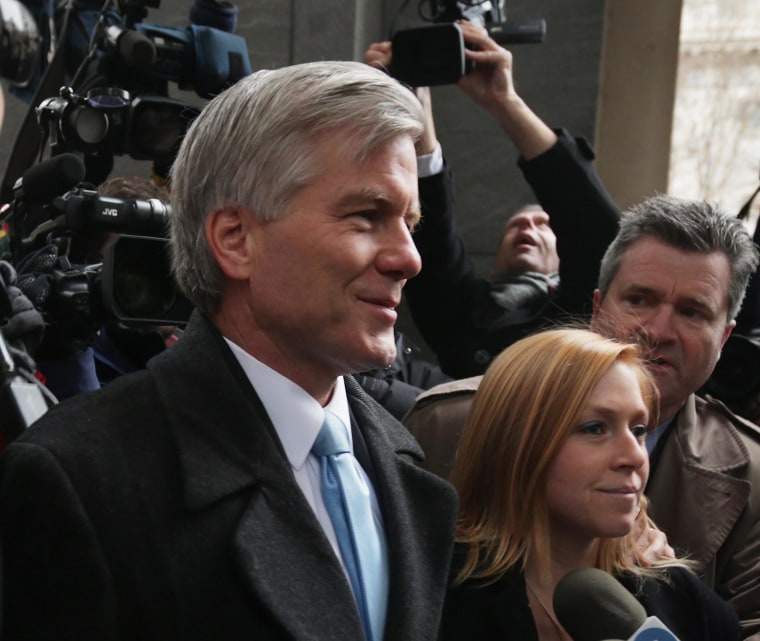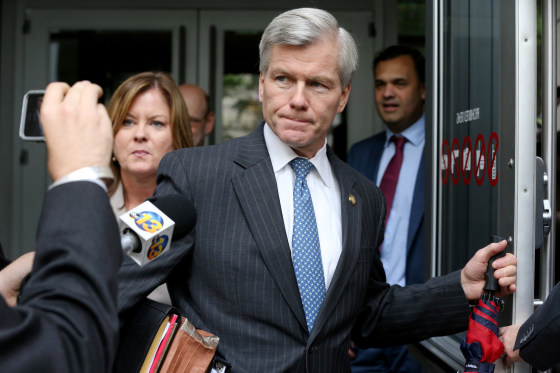The U.S. Supreme Court appeared willing Wednesday to order a new trial for Robert McDonnell, the disgraced former Virginia governor sentenced to prison for bribery.
Though the justices showed no sympathy for McDonnell himself, most of them seemed unwilling to endorse the federal government's view on how broadly the federal bribery laws can reach.
A majority of the court suggested the instructions given to the jury in McDonnell's case painted too broad a picture of what federal law prohibits.
Chief Justice John Roberts noted that a bi-partisan group of former prosecutors and White House lawyers filed a friend of court brief arguing that a defeat for McDonnell would mean that public officials could be imprisoned for doing even the most mundane political favors.
Related: Supreme Court to Hear Corruption Appeal From Former Virginia Governor
"It's extraordinary that those people agree on anything," Robert said.
Justice Stephen Breyer said if the government's view of federal bribery laws is upheld, it could be a potential crime whenever a member of Congress writes a routine letter on behalf of someone who bought lunch.
"That would be a crime? My goodness," Breyer said.

Without a clearer idea of what constitutes an official act in return for a favor, gift, or campaign contribution, "political figures will not know what they're not supposed to do, and the Justice Department becomes the arbitor of how officials are behaving."
Related: Former First Couple of Virginia Puts Hopes in U.S. Supreme Court
Such an outcome, Breyer said, "would be dangerous."
Added Justice Anthony Kennedy, "I don't see the limiting principal" to the goverment's position.
A jury convicted McDonnell in 2014 on a host of federal bribery charges for accepting $175,000 in money and luxury goods from a Virginia businessman who wanted help getting two state universities to conduct research on a diet supplement, so it could be submitted for approval to the Food and Drug Administration.
The businessman, Jonnie Williams, wrote checks to help McDonnell pay credit card and real estate debts and cover the cost of catering his daughter's wedding. Among the gifts were a Rolex watch, $20,000 worth of designer clothes for McDonnell's wife, Maureen, and the use of a country club, a vacation home, and a Ferrari sports car.
None of those favors were illegal under Virginia law, which had no limit on gifts or loans given to public officials. But McDonnell was charged with violating federal anti-corruption statutes.
McDonnell's lawyer, Noel Francisco, told the court that the governor never actually used the power of the his office to help Williams, who never got anything in return. The universities did not agree to research the diet supplement.
McDonnell never "put a thumb on the scales of any government decision," Francisco said. "At most, Governor McDonnell provided access to other officials so Williams could plead his case."
But in its Supreme Court filings the Justice Department said a ruling for McDonnell would scale back the reach of federal bribery laws "and allow the purchase and sale of much of what government employees do."
The government said it doesn't seek to criminalize the courtesies that public officials extend to donors who give legal campaign contributions. In McDonnell's case, "the bribes were personal loans and luxury goods."
"Don't give a stamp of approval to what McDonnell did," Justice Department lawyer Michael Dreeben said Wednesday.
Prosecutors rejected McDonnell's notion that a public official can be prosecuted for accepting money only in return for some formal action or direct pressure exerted on others. The range of official duty includes an office holder's exercise of influence over decisions made by others, they say.
A decision is expected by June. If McDonnell loses, he would report to federal prison to begin serving a two-year sentence.
But a more likely outcome, judging from Wednesday's argument, would be for the court to order a new trial, requiring narrower instructions for jurors on what constitutes an official act.
McDonnell's wife, Maureen, who was also convicted, has also filed an appeal. It is on hold pending the Supreme Court's decision in his case.

